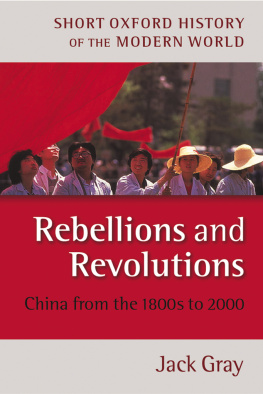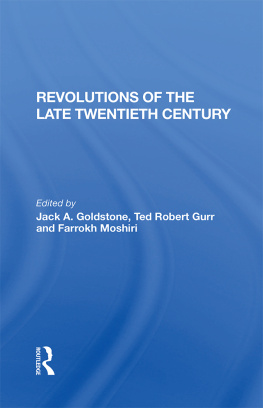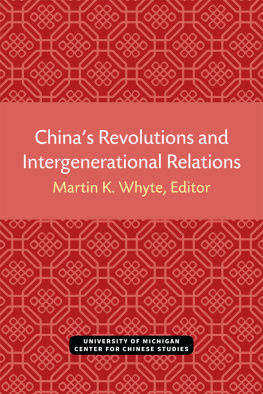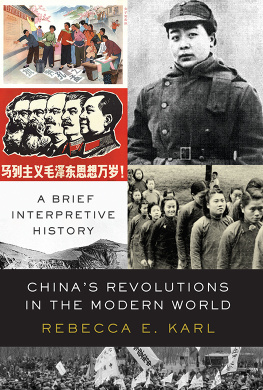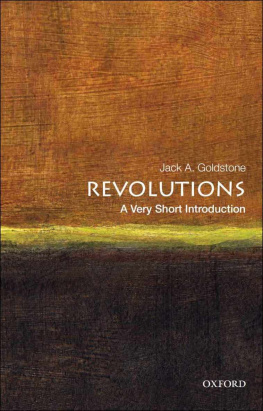Jack Gray - Rebellions and Revolutions: China from the 1880s to 2000
Here you can read online Jack Gray - Rebellions and Revolutions: China from the 1880s to 2000 full text of the book (entire story) in english for free. Download pdf and epub, get meaning, cover and reviews about this ebook. year: 2002, publisher: Oxford University Press, genre: Science. Description of the work, (preface) as well as reviews are available. Best literature library LitArk.com created for fans of good reading and offers a wide selection of genres:
Romance novel
Science fiction
Adventure
Detective
Science
History
Home and family
Prose
Art
Politics
Computer
Non-fiction
Religion
Business
Children
Humor
Choose a favorite category and find really read worthwhile books. Enjoy immersion in the world of imagination, feel the emotions of the characters or learn something new for yourself, make an fascinating discovery.
Rebellions and Revolutions: China from the 1880s to 2000: summary, description and annotation
We offer to read an annotation, description, summary or preface (depends on what the author of the book "Rebellions and Revolutions: China from the 1880s to 2000" wrote himself). If you haven't found the necessary information about the book — write in the comments, we will try to find it.
Jack Gray: author's other books
Who wrote Rebellions and Revolutions: China from the 1880s to 2000? Find out the surname, the name of the author of the book and a list of all author's works by series.
Rebellions and Revolutions: China from the 1880s to 2000 — read online for free the complete book (whole text) full work
Below is the text of the book, divided by pages. System saving the place of the last page read, allows you to conveniently read the book "Rebellions and Revolutions: China from the 1880s to 2000" online for free, without having to search again every time where you left off. Put a bookmark, and you can go to the page where you finished reading at any time.
Font size:
Interval:
Bookmark:

The Short Oxford History of the Modern World
General Editor: J. M. Roberts
The Crisis of Parliaments: English History 15091660
Conrad Russell
The Old European Order 16001800
Second Edition William Doyle
The Limits of Liberty: American History 16071980
Maldwyn A. Jones
The British Empire 15581995
Second Edition
T O. Lloyd
Modern India: The Origins of an Asian Democracy
Judith M. Brown
Barricades and Borders: Europe 18001914
Third Edition
Robert Gildea
Rebellions and Revolutions: China from the 1800s to 2000
Second Edition Jack Gray
British History 18151906
Richard Bonney
Empire, Welfare State, Europe: History of the United Kingdom 19062001
Fifth Edition
T. O. Lloyd
China from the 1800s to 2000
Second edition
Jack Gray


Great Clarendon Street, Oxford OX2 6DP
Oxford University Press is a department of the University of Oxford. It furthers the Universitys objective of excellence in research, scholarship, and education by publishing worldwide in
Oxford New York
Auckland Bangkok Buenos Aires Cape Town Chennai
Dar es Salaam Delhi Hong Kong Istanbul Karachi Kolkata
Kuala Lumpur Madrid Melbourne Mexico City Mumbai Nairobi
So Paulo Shanghai Singapore Taipei Tokyo Toronto
Oxford is a registered trade mark of Oxford University Press in the UK and in certain other countries
Published in the United States
by Oxford University Press Inc., New York
Jack Gray 2002
The moral rights of the author have been asserted
Database right Oxford University Press (maker)
First edition 1990
All rights reserved. No part of this publication may be reproduced, stored in a retrieval system, or transmitted, in any form or by any means, without the prior permission in writing of Oxford University Press, or as expressly permitted by law, or under terms agreed with the appropriate reprographics rights organizations. Enquiries concerning reproduction outside the scope of the above should be sent to the Rights Department, Oxford University Press, at the address above
You must not circulate this book in any other binding or cover and you must impose this same condition on any acquirer
British Library Cataloguing in Publication Data
Data available
Library of Congress Cataloging in Publication Data
Data available
ISBN 0198700695
1 3 5 7 9 10 8 6 4 2
Typeset in Minion and Congress Sans by RefineCatch Limited, Bungay, Suffolk
TO MAISIE
The historian of modern China is not given much room for manuvre in his choice of themes. They impose themselves. The first is the causes of the collapse of the Chinese Empire which, founded two centuries before Christ, had survived into the modern age; the failure of what had hitherto been the most promising quarter of mankindprobably the most productive, possibly the best governed and certainly the most innovativesets a fascinating problem.
The second question raised is the prolonged failure of China to respond to the challenge posed by the coming of the West, and the question is sharpened by the unavoidable contrast with the success of Japan which, when subjected by the Western powers to precisely the same regime as they had imposed on China, moved with extraordinary rapidity to modernize and join the ranks of the industrialized powers. Related to this is the question whether the privileges of the foreign powers in China proved to be on balance a hindrance or help to her transformation; and here the fact that Japan succeeded so well, in spite of the imposition of the same privileges, throws doubt on the idea that foreign privilege was the decisive factor in preventing Chinas modernization. More important, the records of the Chinese economy in the early twentieth century, gradually made available by modern scholarship, suggest that the assertion that Chinas efforts failed miserably is not altogether true, and has persisted only as one of the nationalist and communist myths which must be eliminated before any valid assessment of modern Chinas history can be attempted.
When we move on to the rise and victory of the Chinese Communist Party we face the question whether this was really the result of a broad-based peasant revolution, or whether its cause was essentially military, and it was perhaps possible only because the Japanese invasion of China, being directed against the ports and urban centres defended by the Nationalists, left comparatively unscathed the remoter rural areas in which the Communists operated, leaving them free to build up formidable military strength through guerrilla campaigns.
The major theme presented by post-revolutionary China starts from Mao Zedongs rejection of Stalinism in the late 1950s and the gradual hammering out, through much strife and agony, of a Chinese alternative to the Soviet-style command economy, an alternative which has implications far beyond the borders of China in so far as it presents new possibilities not only for Marxist socialism but for the rest of the Third World in its struggle against poverty. Not the least interesting aspect of this alternative is that it represents the incorporation into socialism of certain traditional Chinese economic values and expectations; the socialism with Chinese characteristics advocated by Deng Xiaoping is perhaps Chinese in a sense of which Deng and his fellow reformers are not fully conscious.
The revival of these traditional values raises the further question of how far China in the course of revolution has remained Chinese. The dilemma of her first modern nationalists was that the drastic changes necessary to preserve China as a nation might destroy her as a culture and eliminate everything that gave the Chinese their identity. Yet perhaps tradition has proved to be tougher than they expected. The traditional political culture has survived the revolution very well. As with the Poles, the Hungarians and the Czechs, the nations world of historical images and references has not altogether been replaced by Marxism. The great historical figures of Confucian virtue and vice may still be more real to most Chinese than Marx and Lenin. When in 1959 Marshal Peng Dehuai was advised by his friends to cease his criticism of Mao Zedongs Great Leap Forward, he identified himself not with some figure from socialist history but with the Ming official Hai Rui, who had reprimanded the Emperor at the risk of his life. When in 1962 a group of Chinese intellectuals started a campaign against the Marxist assertion that there is no morality above class, they began at the grave of Confucius. Perhaps the most striking evidence of all comes from a recent Chinese urban opinion poll (1987) which showed that filial disobedience was still the moral defect most strongly condemned.
The final theme which presents itself to our attention is the evolution of Chinas new place in the family of nations. When, after 1949, the new regime had ruthlessly squeezed out all foreign economic interests, China found it necessary to enter into a fraternal treaty with the Soviet Union which, ironically, reasserted many of the features of the unequal treaties imposed on China in the nineteenth century. Khrushchev rescinded these arrangements, but by this time the divergence of interests and ideology between China and the Soviet Union had reached such a point that he earned no gratitude for his liberality. Thus China, having incurred the enmity of the United States of America since the Korean War, now chose to brave the hostility of the other superpower. To find a way out of this dangerous isolation, Mao Zedong chose to reach a
Font size:
Interval:
Bookmark:
Similar books «Rebellions and Revolutions: China from the 1880s to 2000»
Look at similar books to Rebellions and Revolutions: China from the 1880s to 2000. We have selected literature similar in name and meaning in the hope of providing readers with more options to find new, interesting, not yet read works.
Discussion, reviews of the book Rebellions and Revolutions: China from the 1880s to 2000 and just readers' own opinions. Leave your comments, write what you think about the work, its meaning or the main characters. Specify what exactly you liked and what you didn't like, and why you think so.

